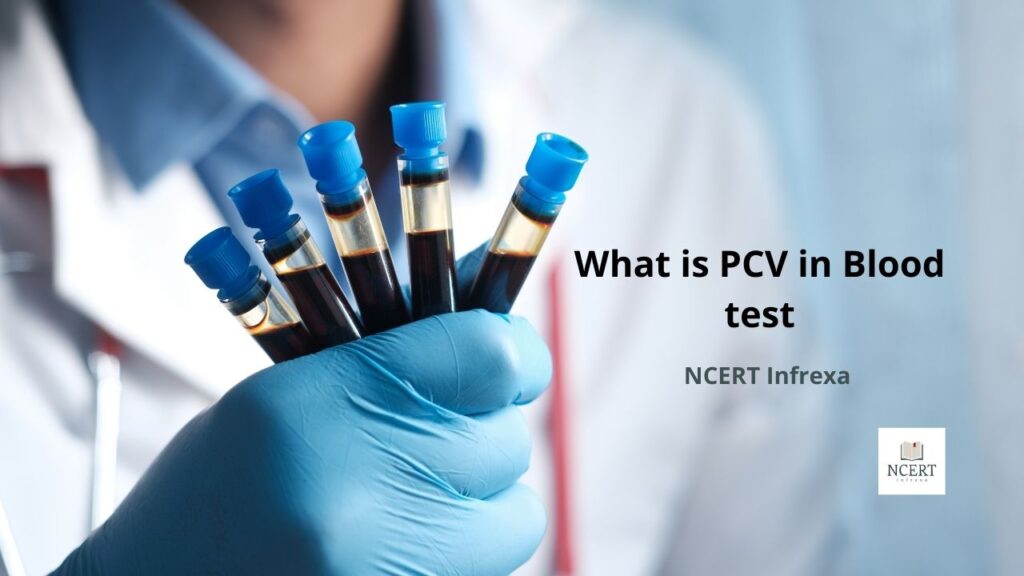PCV or “Packed Cell Volume” test, which is also known as the hematocrit test, is a type of blood test done to diagnose multiple abnormalities in the blood like – polycythemia, dehydration or anemia, etc.
PCV Blood test determines the proportion of red blood cells in your blood. A doctor can prescribe this test to you for a variety of reasons, for example, to detect health abnormalities, the need for blood transfusion, or to monitor the response to treatment.
This content is also available in Hindi. Please click here to read it in Hindi
What is PCV in blood tests?
PCV in blood tests means the count of hematocrit cells in the blood. Hematocrit cells are, generally, red blood cells, and the test that measures these cells is known as the Packed volume test (PCV Test) or Hematocrit test.
| Full form | Packed Cell Volume test |
| Other Name (s) | Hematocrit, VPRC, EVF |
| Test-type | Blood Test |
| Test methods | Automated analyzer, Centrifuging EDTA, Spectrophotometry |
PCV or Packed Cell Volume test is popularly known as the hematocrit test, which means “to separate blood”. It is also known as the Erythrocyte volume fraction (EVF) or Volume of packed red cells (VPRC) test.
It is a normal blood test that measures how much of the blood consists of cells. Low or too high PCV readings may be a sign of certain diseases.
Why PCV or Hematocrit test done
PCV or Hematocrit test is part of a complete blood count test that determines the proportion of red blood cells in your blood. A hematocrit test is done or often done by a doctor to diagnose your health, monitor the response to treatment, check the need for blood transfusion, or interpret the health conditions.
This is a very simple test, and the readings obtained from it can provide a lot of information regarding the patient’s medical conditions and also help doctors to make the right treatment plan.
Normal values
If the PCV test has shown the normal PCV readings that means no health abnormality is present and therefore you need not worry about your health.
Normal values of the PCV may vary substantially with race, age, and gender. Gender-based normal ranges are given below for reference –
| Gender | Normal values |
|---|---|
| Male | 38.3 – 48.6 |
| Female | 35.5 – 44.9 |
What if you have a lower PCV than normal
If PCV is low, that means you have low red blood cells (RBC) and are suffering from anemia or any health-related problems.
Once the doctor sees your low PCV, he may advise you to undergo some further lab tests to reveal the underlying causes of the disease and arrive at a solid conclusion.
Reasons/causes of low PCV
Certain medical conditions contribute to Low PCV, which include –
- Anemia.
- Mineral or vitamin (E.g, B12 or folate) deficiencies.
- Renal diseases (E.g., CKD, including if you are on haemodialysis).
- Blood loss due to an accident or a long-term disease.
- Any Inflammatory conditions such as – Rheumatoid arthritis.
- Infection or a white blood cell disorder, such as leukemia or lymphoma.
- Side effects of any medicine.
What if you have a higher PCV than normal
Increased PCV implies dehydration or an abnormal increase in red blood cell production. In the common cases of dehydration, the RBC gets concentrated in the blood reflecting higher PCV readings.
However, a doctor asks you to undergo some further screenings for better findings of the causes.
Reasons/causes of high PCV
The most common reason for elevated PCV (Hematocrit) is dehydration, which can be treated at home by taking an adequate amount of fluid and water. However, this is not a reason for all cases, as some abnormal health conditions can lead to higher hematocrit (PCV), such as –
- Polycythaemia
- Lung or
- Cardiovascular disease
How to prepare for the PCV test
You need not do any special preparation before this test because this is a simple test. However, if you are uncomfortable before the test, communicate with your doctor clearly and give yourself some relief.
Additionally, if you are on regular medication or have any medical problems, please brief your doctor before the test procedure begins.
Test procedure
No special procedure is followed while collecting the sample. A lab technician simply inserts a needle and draws a blood sample from a vein in your arm.
While blood is taken from your vein, you may feela little pain or prickling. You may also feel tenderness at the site however, all these may go away after some time by themselves.
In most cases you may resume normal activities afterward, there are very less but possible chances of happening anything wrong during the procedure so always be cautious about things and consult your doctor in case of an emergency.
Results
There are two other ways to calculate the PCV in blood, for example, spectrophotometry and capillary tube methods but most labs use a self-controlled and fully automated analyzer to read the number of PCV in blood.
This analyzer automatically measures the PCV counts in your blood and produces a printout of the reports.
Generally, the results from your hematocrit test are reported based on the percentage of your blood volume that is composed of red blood cells (RBCs).
Please note normal results may also vary from one medical practice to another. Your hematocrit or PCV test results just give an overview of your medical conditions to your doctor.
For a better diagnosis of the disease, always consult your doctor with reports and tell them all about the symptoms you are experiencing. Based on these symptoms, a doctor may ask you to have some other tests to investigate the underlying causes of the disease.
Factors affecting results
High or Low PCV test results do not always mean that you have some health-related disorders because these test results may be adversely affected by some factors and give inaccurate or misleading results. Discuss with your doctor and help him figure out the situation, if –
- You are living in a high-altitude place and have come to see a doctor in another city
- Recently had blood loss in an accident
- You are pregnant
- Got a recent blood transfusion
- You have severe dehydration
Importance of the test
The hematocrit test is very useful in diagnosing certain medical conditions. The test results interpret specific health problems in your body and help doctors to make the right treatment plan for you.
PCV Test cost – PCV test cost in India
Like any other lab test, the PCV blood test prices may vary from one lab to another. The automated test cost of the PCV is less likely priced than other modes of tests.
The PCV test cost in India may differ between Rs. 100 to 200 INR for different cities or labs.




